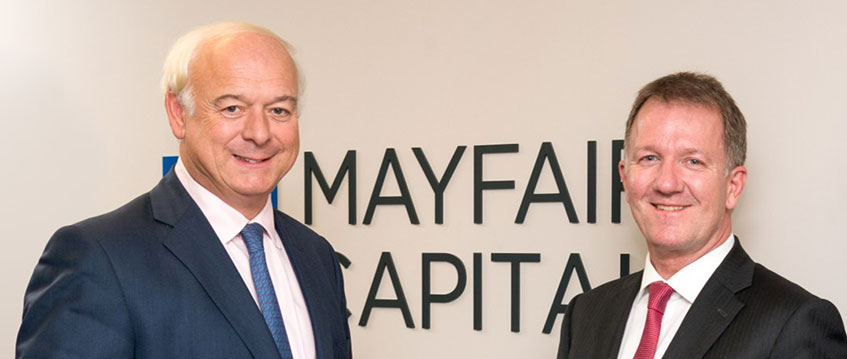Swiss Life and Mayfair Capital eye the upturn after Covid-19
Like many people, from boardroom bosses down to those on the factory floor, Stefan Mächler (pictured above, right) is trying to find every silver lining he can as the coronavirus pandemic changes the way he works.
For the group chief investment officer at Zurich-based insurer Swiss Life, close to the top of the list is the simple pleasure of a home-cooked lunch with his wife each working day. “It’s not very important,” he says with a laugh, “but it was an experience I’d never had.”
New experiences are coming thick and fast for investment professionals during this crisis. Mächler has been through enough market cycles to ride out ups and downs – “I’m turning 60 this year. I’ve seen many crises,” he says – but the situation around Covid-19 feels different.
Like many people, from boardroom bosses down to those on the factory floor, Stefan Mächler (pictured above, right) is trying to find every silver lining he can as the coronavirus pandemic changes the way he works.
For the group chief investment officer at Zurich-based insurer Swiss Life, close to the top of the list is the simple pleasure of a home-cooked lunch with his wife each working day. “It’s not very important,” he says with a laugh, “but it was an experience I’d never had.”
New experiences are coming thick and fast for investment professionals during this crisis. Mächler has been through enough market cycles to ride out ups and downs – “I’m turning 60 this year. I’ve seen many crises,” he says – but the situation around Covid-19 feels different.
“This is unprecedented in recent history,” Mächler says. “Comparisons with the financial crisis are difficult. Maybe there are some similarities with the Spanish flu, but that was 100 years ago at a different state of medicine and globalisation.”
Mächler is hopeful of a U-shaped economic recovery in Europe if enough countries follow the nascent revivals seen in China and South Korea. For now, the house view is that there is a 50% chance of that happening.
Remote control
In the meantime, Mächler and colleagues in various group subsidiaries across five countries have grappled with how to manage the business remotely and steer it through an unavoidable downturn.
In London, at Swiss Life-owned real estate fund manager Mayfair Capital, that means deals disappearing and volatility hitting values.
Mayfair Capital’s Property Income Trust for Charities was suspended under a “material uncertainty” valuation clause on 19 March, joining several other real estate funds targeting retail and institutional investors that have pulled down the shutters in recent weeks.
“The market, of course, has dried up,” says James Thornton, Mayfair Capital’s chief executive (pictured above, left), in a joint interview with Mächler. “Our transaction team is monitoring 100-plus offerings that came into the market in February to see what the outcome for each has been.
“There have been exchanges of the agreed price. There have been deals dropped, there have been attempted price chips. And the market is gradually fizzling out. Nobody is going to bring anything to the market now, just because of the physical difficulties.”
Keeping the coffers full
The firm’s asset managers have remained busy trying to ensure that they collect every pound of rent from tenants that they can, while working with those that might be in difficulty.
“The asset managers have been working with our managing agents to make sure that we collect as much rent as we can and, where tenants aren’t willing to pay, that we’re not being taken advantage of,” Thornton says. “We have guidelines to make sure that we see management accounts. We want to see evidence that they can’t pay the rent rather than just giving a concession because they’ve asked for one.”
Speaking to EG in early April, Thornton says the firm has collected somewhere between 65% and 70% of rent due.
Strategic rethink
Thornton, Mächler and colleagues are now looking ahead to what happens once this crisis recedes.
“If we can take China and Korea as a lead for timescales, we’ve got to be ready in our business for a much busier autumn in terms of a resumption of activity,” Thornton says.
“There will be a strategic rethink when we know how badly the UK economy has been affected, and we will then seek to analyse what impact that has on property markets. And there will be changes that come out of this, I’m sure.
“We can expect to see more online spending, for example. We’re all working from home at the moment and it’s proven to work, but it may well be that over time there is lower overall demand for office space per worker because of more home working. And if you look at UK industry, you see the pandemic interrupting global supply chains, so we might see more manufacturing being on-shored.
“These are all things that we will be thinking about as we seek to deploy our clients’ equity when the markets reopen.”
To send feedback, e-mail tim.burke@egi.co.uk or tweet @_tim_burke or @estatesgazette











